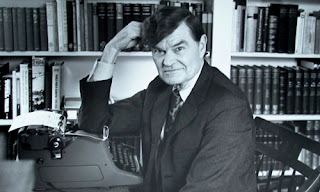When President Obama went to Japan last week and became the first sitting U.S, President to visit Hiroshima, he expressed regret about the atomic bomb but did not apologize for the use of them on Hiroshima and Nagasaki. The media discussed the ramification of the atomic bomb, but many commentators stopped short of saying the bombs shouldn't have been used, and polls increasingly show that more Americans don't think the bombs should have been used.
And then there was Paul Fussell.
Fussell, one of America's great literary scholars, wrote a controversial essay in 1981 that was as provocative as its title: "Thank God For the Atom Bomb," which made the argument that the atomic bombs dropped on Japan saved more lives than it took. Fussell, who died in 2012, was a young second lieutenant in the infantry who had been seriously wounded in France in the closing days of World War II in Europe and would likely have taken part in an invasion of Japan - plans were for thirteen infantry divisions to strike the home island of Kyushu in November 1945, and
sixteen divisions were slated for an attack on the home island of Honshu in March 1946. The assumption was that it would take until November 1946 for Japan to surrender after every man, woman and child fought to the death against the invading American, British and Soviet forces. The death toll could very well have been in the millions.
Fussell reminded his readers that the Japanese people may have been sweet, gentle souls in the early eighties, but the Japanese people the Allies anticipated encountering in 1945 were far different. They were a fearless people willing to fight and die for Emperor Hirohito and the glory of their country. The Japanese were not ones to give up easily in defending their homeland, which is why President Truman all but implored Stalin to declare war on Japan once Germany was defeated. (Until the Soviets did declare war on Japan two days after the Hiroshima bombing, Stalin's only enemy was Nazi Germany, and no nation suffered more greatly in World War II than the Soviet Union.) Fussell made it clear that the purpose of the atomic bomb was "not to punish people" to stop the war. He noted with incredible subtlety that those who argued against the A-bomb, including economist John Kenneth Galbraith, thought the war would likely have ended by November 1945 if there had been an invasion of Japan, and that the bombs only shortened it by "two to three weeks," a period in which many Americans would have lost their lives.
"What did he do in the war?" Fussell asked of Galbraith. "He worked
in the Office of Price Administration in Washington. I don't demand that he
experience having his ass shot off. I merely note that he didn't."
The atomic bombs, by the way, were originally intended for use on Germany, a point not lost on Fussell in his memoir "Doing Battle": "If only the bombs could have been produced and dropped at the right moment on Hitler's headquarters (where Colonel Von Stauffenberg's July 20, 1944 bomb didn't do the job because it wasn't big enough), much of the Nazi hierarchy would have been pulverized immediately, saving the lives of around four million Jews, Poles, Slavs and Gypsies, not to mention the lives and limbs of millions of Allied - and German - soldiers. If the bombs had only been ready in time, the boys in my platoon would not have been so cruelly killed or wounded."
The idea of war crimes may sound redundant to any man who had the misfortune of serving in combat, particularly when an act of war is recognized by such men as a means of ending it. All war, we are told, is a crime. The Australian writer Frederic Manning went even further: "War is waged by men; not by beasts, or by gods. It is a
peculiarly human activity. To call it a crime against mankind is to miss at
least half its significance; it is also the punishment of a crime."
As for Fussell, he remembered his jubilation for himself and his comrades in arms when it became apparent that a land vision of Japan's four home islands had been rendered unnecessary by the atom bombs dropped on Hiroshima and Nagasaki: "We were going to live. We were going to grow up to adulthood after all."
I don't profess to know anything about war, but Fussell certainly did, and while reading his essay may not change your mind regarding whether or not the use of atomic bombs to end World War II was justified, his essay still a thought-provoking read, and I encourage you to read it rather than go by this explanation of it, as this blog entry cannot substitute for the essay itself in its proper context. A link to it is here.





No comments:
Post a Comment